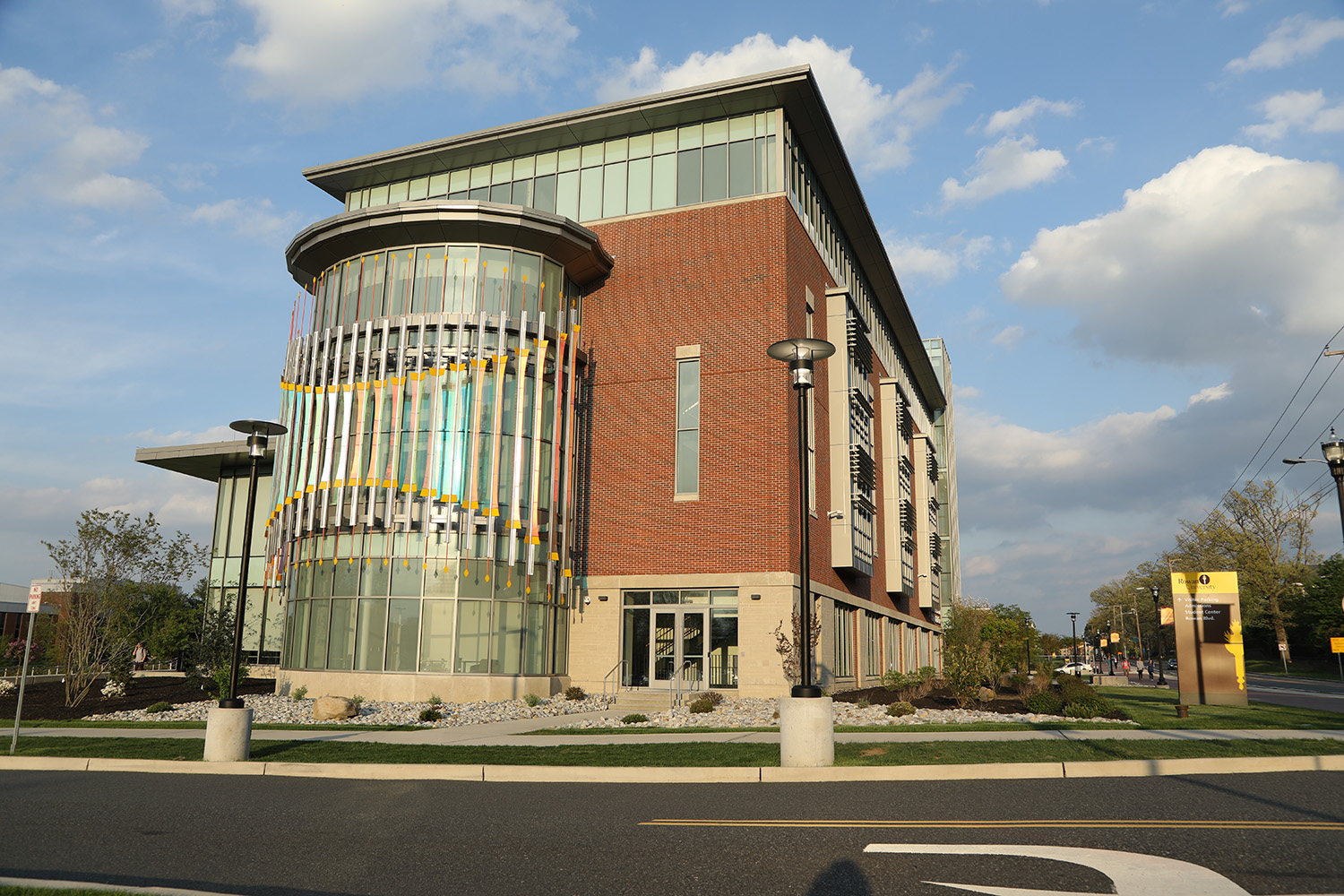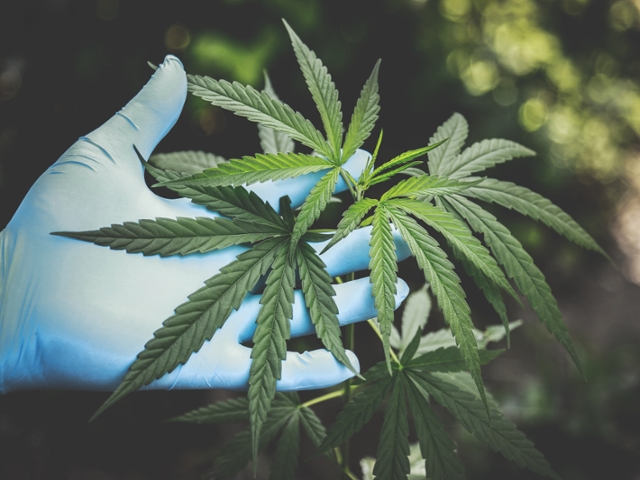Master of Business Administration Concentration: Cannabis Commercialization
Master of Business Administration Concentration: Cannabis Commercialization
Cannabis Commercialization Concentration in Rowan's MBA
Why an MBA Concentration in Cannabis Commercialization?
An MBA Concentration in Cannabis Commercialization is an ideal option for those who want to expand their career options in or adjacent to the rapidly evolving cannabis industry, which is anticipated to become a multi-billion-dollar economic driver across the USA—and beyond.
Career opportunities related to cannabis are vast, and crossover talent is in high demand. Plant-touching verticals, such as cultivation, extraction, manufacturing, and retail, need experts from other industries to adapt, refine, and extend best practices into the highly regulated cannabis market. There is a strong and growing demand for ancillary businesses complementing and serving the cannabis industry, with potential career pathways in services such as:
- accounting and tax;
- finance and banking;
- data analysis;
- marketing and branding;
- supply chain; and
- human resources.
Whether you are drawn to plant touching verticals or ancillary cannabis business career pathways—or want to explore options in both categories—you can tailor the Cannabis Commercialization Concentration to support your career goals.

Rowan University launches MBA Concentration in Cannabis Commercialization
The Rowan University MBA is the first and only AACSB-accredited program in the country offering business-focused cannabis coursework designed to meet the emerging and evolving needs of the cannabis industry. AACSB International is the premier accrediting agency for business schools and colleges, whose accreditation is synonymous with the highest standards in business education. New Jersey adopted reform legislation in 2010 to issue licenses for the cultivation, manufacture, and sale of marijuana, at first for doctor-supervised patients with specific conditions, and then for adult use. Rowan has been working with industry leaders since 2021 to create workforce development and research opportunities in cannabis. Learn more about the programs and research initiatives at Rowan below.
MBA Curriculum Requirements and Options
Core, Customizable, and Foundational Course Requirements
Rowan MBA students complete 18 credits of required coursework to satisfy the core requirements of the 36-credit curriculum. The core requirements can be completed in an individualized order, depending on the student’s needs.
Rowan MBA students also enjoy the freedom to customize the remaining 18 credits (6 three-credit courses) to meet their individual career pursuits. The 18 customizable credits (6 courses) can be arranged to include two areas of concentration or one area of concentration plus three elective courses.
Some foundational coursework may be required, which can be done in a variety of ways, such as equivalent undergraduate courses, noncredit tests, online courses, and community college classes. To see a full list of admission requirements, visit the Rowan University main MBA website page and click Admission Requirements or review our Foundation Fact Sheet. Contact our Program Coordinator at graduatebusinessstudies@rowan.edu for help with Foundation courses.
For pre-admission advising contact the Assistant Director of Global Admissions, Tendai Vengesa, at global@rowan.edu.
How do Specialized Concentrations Work?
Possible Ways to Customize MBA Concentrations at RCB:

Cannabis Commercialization Concentration Coursework
Explore competitive dynamics, opportunities for innovation, and the current business landscapes of the rapidly evolving and highly regulated cannabis industry. Delve into concepts and constructs that are unique to the cannabis industry while investigating business model innovations that are applicable across industries.
Rowan MBA students who pursue a Concentration in Cannabis Commercialization select 3 courses (9 credits) to satisfy the Concentration. Of the three courses, two are required:
- Evolution of the Cannabis Industry
- Business Model Innovation in Cannabis
Students then choose one elective course tailored toward achieving their particular career goals within the cannabis industry.
MBA Students have the potential to take more than three classes from the list below, depending on their interests and goals and the flexibility and space available in their individual course of study. Contact an academic advisor from the Graduate Business Studies office at graduatebusinessstudies@rowan.edu if interested in adding any of these classes to your course schedule.
Click on the course titles to review the descriptions.
Required Core Coursework—Course codes, Titles and Descriptions
ENT 06520 - Evolution of the Cannabis Industry (3 s.h./credits) – Online
ENT 06520 - Evolution of the Cannabis Industry (3 s.h./credits) - Online
This industry analysis course forces students to develop a deep understanding of the cannabis industry, its history, competitive dynamics, opportunities for innovation, and the current business landscape. A historical overview will address the origins of cannabis, 19th century legal uses, early prohibition, counterculture, the war on drugs, state medical legalization, new approaches to adult use, and current and potential future federal laws. An overview of the cannabis plant will review hemp vs. marijuana as well as products, ingestion methods, and the endocannabinoid system. An overview of laws and regulations will include federal vs. state vs. local, complexities in the system, and provisions relating to medical vs. adult use (recreational). Social equity will be focused on from perspectives including the lasting effects of the war on drugs, reinvesting in communities disproportionately impacted, and racial and social justice. Key points on cultivation will be reviewed such as plant science, facilities, financials, and regulatory compliance. Definitions and examples of business types in categories of plant-touching vs. ancillary will be addressed. Drivers of demand will be examined such as medical and adult (recreational) use, health and wellness, current and projected demographics, and genetics of plant strains. Analysis of the economics of cannabis will include markets across the industry, potential economic impact, public policy implications, and financial barriers to entry. Considerations for retail in cannabis will include products, in-store experiences, in-person retail and tech-based platforms for ordering and delivery, and social consumption via lounges, concerts, and other public venues.
ENT 06521 - Business Model Innovation in Cannabis (3 s.h./credits) – Online
ENT 06521 - Business Model Innovation in Cannabis (3 s.h./credits) – Online
Students in this course will explore business model innovations that are applicable across industries, and they will also delve into concepts and constructs that are unique to the highly regulated and rapidly evolving cannabis industry. In exploring contemporary business models and corporate structure, students will learn about common patterns and how to systematically understand, design, and implement a game-changing business model—or how to analyze and renovate an old one. Key elements for business model innovation across all industries to be analyzed include customer segments, value propositions, channels, customer relationships, revenue streams, key resources, key activities, key partners, and cost structure. Students will learn how to identify, create, and deliver value for existing and future customers, as well as how to extract value for a corporate venture in a sustainable manner. Fundamentals of new venture financing will be considered, such as capital structures for new ventures (e.g., debt vs. equity), term sheets and how to negotiate them, and early-stage vs. later-stage financing. Cannabis-specific business model implications will be explored in depth as well. This exploration includes trademarks and IP, marketing and branding, multistate operators (MSOs) vs. standalone businesses, challenges and benefits of vertical integration, costs for licensing and compliance, and rules and regulations regarding plant-touching vs. ancillary businesses. Students will also learn about the most challenging financial hurdles for plant-touching cannabis entrepreneurs and operators: banking (given that most national institutions are not willing to support due to federal illegality) and IRS 280E Tax Code (no deductions or credits are allowed for federally controlled substances).
Cannabis Commercialization Concentration—Elective Coursework
The Cannabis Commercialization Concentration approaches the cannabis industry from an interdisciplinary perspective. Given the critical connections the industry has to business, law, science of cannabis, and the social sciences, students have the opportunity to choose one elective course that aligns with their own specific interests and career goals related to the cannabis industry.
Choose One Elective (3 credits) from the Following Options:
For MBA students interested in adding any of these electives to your schedule, contact the Graduate Business Studies office at graduatebusinessstudies@rowan.edu to speak to an academic advisor.
While some of the elective options focus directly on cannabis, other courses explore concepts and knowledge bases that are relevant to and in-demand for the cannabis industry.
Elective Options—Cannabis-Focused
CANN 03501 - Cannabis Legislation, Regulations, and Policy Evaluation
CANN 03501 - Cannabis Legislation, Regulations, and Policy Evaluation (3 s.h.)
This course will examine the legislative, regulatory, and policy landscapes for the cultivation, manufacture, and retail sale of cannabis in the legal market. While an emphasis will be on New Jersey regulations, statutes, and policies, students will also gain a clear understanding of federal policies, laws and regulations that govern the legal cannabis industry and how these policies impact compliance. Furthermore, the medicinal use of cannabis, public safety, and how the various policies interact and impact institutions, workplaces, and social equity will be explored. Additionally, various federal, state, local and industry-wide cannabis compliance topics will be outlined and discussed in this course.
CANN 03502 - Marijuana Legalization and Decriminalization in Work, Leisure, and Settings
CANN 03502 - Marijuana Legalization and Decriminalization in Work, Leisure, and Settings (3 s.h.)
The problems, nature, and effects of cannabis legalization and/or decriminalization within and across workplace settings and institutions such as families, leisure facilities, schools/higher education institutions, health care facilities/hospitals, transportation hubs, police departments, jails, and prisons will be explored. The course will emphasize the use of cannabis in social and institutional contexts, the legal implications of cannabis use within institutions, and approaches for counteracting and avoiding cannabis use including, community and testing programs, and policies will be examined. Social control and programmatic approaches in the context of promoting a safe and productive environment and a part of regulatory compliance will be discussed.
CANN 03503 - Cannabis Research, Program Evaluation, and Policy Development
CANN 03503 - Cannabis Research, Program Evaluation, and Policy Development (3 s.h.)
This course offers an applied approach to systematically collect and analyze data on the performance of programs and policies with a focus on determining whether a particular program or policy is achieving its goals. In this course, students will examine evaluation designs to better understand different programmatic and research assumptions to assist in program development and policymaking in the field of cannabis and the cannabis industry.
CHEM 09530 - Advanced Chemical Analysis of Cannabinoids
CHEM 09530 - Advanced Chemical Analysis of Cannabinoids (3 s.h.)
This course is an introduction to the various aspects of chemical analysis that are used for the characterization of cannabinoid content in a variety of natural and commercial products. The focus will be on extraction, spectroscopic (including IR, UV/Vis, and mass spectrometry), and chromatographic techniques (gas chromatography, liquid chromatography, preparative chromatography, and supercritical fluid chromatography), specifically related to their use for cannabinoid analysis, residual solvent measurements, and pesticide detection. For RCB students seeking the MBA Concentration or COGS in Cannabis Commercialization, this course will require you to complete a “self-directed bootcamp” with approximately 10 hours of advance work so that you are prepared with an appropriate foundation prior to beginning the course; you will be provided with appropriate material for review (e.g., readings, videos, audio files, etc.), but you must commit to pursuing this content independently (e.g., no faculty oversight or feedback).
The following courses are included in the Cannabis Commercialization Concentration but are not Cannabis-focused. These topics and disciplines are vital to cannabis studies. MBA or COGS students who choose their electives from this grouping will bring the knowledge gained in their required cannabis courses to bear on the wider content offered within these elective courses.
Elective Options—Complementary Coursework
CJ 09529 - Community Justice
CJ 09529 - Community Justice (3 s.h.)
This course will examine how the community can work with police, courts, and correctional agencies to prevent crime and rehabilitate and reintegrate offenders. It will examine the effect on implementing community programs of the organizational environment and effective recruitment, screening, and training of community members. Techniques such as participatory management, collaboration, problem-solving, and mediation will be examined. Students also will learn to critically assess and design evaluations of community programs.
CJ 09532 - Race, Ethnicity, Class and Justice
CJ 09532 - Race, Ethnicity, Class, and Justice (3 s.h.)
This graduate course will include an in-depth study of race, ethnicity, and class, and their evolving impact upon the U.S. criminal justice system, as well as the system's impact on marginalized groups, people from a lower socioeconomic status, and communities facing high crime rates and/or high rates of incarceration. A major focus of this course will be a critical examination and analysis of how race, ethnicity, and socioeconomic status impact the nature, content, and quality of justice rendered within the United States. One major purpose of the study is to provide students with an opportunity to gain sophisticated understanding of the inequities that minorities experience within our system of justice and in the wider community. Students will learn to critically assess significant research concerning race, ethnicity and class and the criminal justice system, and understand the practical applications of this research.
DA 02510 - Visual Analytics
DA 02510 - Visual Analytics (3 s.h.)
DI 68501 - Intro to Diversity and Inclusion
DI 68501 - Intro to Diversity and Inclusion (3 s.h.)
This course will introduce students to the study of Diversity and Inclusion and the concepts of inclusion and exclusion through critically examining ascribed statuses, the roots and intractability of the exclusion of groups cast as subordinated, the concepts of privilege and disprivilege, and the different realities at the intersections of multiple minority group statuses. The course will prepare students to become change agents, able to contribute to the deinstitutionalizing of the "isms" in their educational, employment, and social network environments.
ENT 06505 - Entrepreneurship & Innovation
ENT 06505 - Entrepreneurship & Innovation (3 s.h.)
This course provides a broad framework for understanding the nature of entrepreneurship in multiple organizational settings. The course introduces students to the innovation and idea generation process and helps students apply an alternative way of "thinking" to assist in solving difficult issues for government, business, and the non-profit sector.
ENT 06599 – Special Topics: Social Entrepreneurship and Impact Investing for Change
ENT 06599 – Special Topics: Social Entrepreneurship and Impact Investing for Change (3 s.h.)
This course presents an overview of social entrepreneurship through the lens of effective altruism. Students will learn at a global level and how to approach and solve some of society's biggest challenges, as framed by the United Nations Sustainable Development Goals. Topics include defining and evaluating impact, building sustainable and scalable business models, and challenges including poverty, health care, childcare, disaster relief, sweatshops, and more.
FIN 04512 - Capital Budgeting
FIN 04512 - Capital Budgeting (3 s.h.)
HIST 05519 - Political and Social Movements in the U.S.
HIST 05519 - Political and Social Movements in the U.S. (3 s.h.)
This course will introduce students to the history of social and political movements in the United States to demonstrate how diverse organizations and major figures have challenged institutional discrimination. Students will learn how marginalized groups have sought varied ways to challenge prejudice, implicit bias, and oppressive power structures, using a historical, political, and social lens to understand racism, sexism, heterosexism, classism, ethnocentrism, and religious intolerance. Students will use these lenses to assess contemporary actions to alleviate inequity.
MGT 06530 - Sustainable Commerce
MGT 06530 - Sustainable Commerce (3 s.h.)
Students will examine the notion of “sustainable business” in this course. Students will learn about different types of ‘green’ and sustainable businesses and evaluate many case studies of businesses that have been successful in improving their environmental impact and social performance while also remaining profitable. Students will gain an understanding of social venturing and continue to develop their entrepreneurial skill sets and mindsets. Students will develop their own approaches to evaluating the sustainability of a business while also learning about emerging norms and frameworks. Students will examine sustainability as a concept impacting all aspects of a business, from operations and product design to finance, marketing, and human resources management. The impacts of “green” industries, products, and business practices are also examined.
MGT 06531 - Sustainability Assessment
MGT 06531 - Sustainability Assessment (3 s.h.)
Students will learn different approaches for setting sustainability goals, measuring progress towards sustainability outcomes, and managing so-called “sustainability transitions”. Students will learn about the increasingly important role of sustainability officers in different firms and gain exposure to concepts and practices in sustainability reporting for shareholder, regulatory, and scientific purposes. This course may be offered online. Students will learn different approaches for setting sustainability goals, measuring progress towards sustainability outcomes, and managing so-called “sustainability transitions”.
MGT 06601 - Strategic Planning for Operating Managers
MGT 06601 - Strategic Planning for Operating Managers (3 s.h.)
This course prepares the operating manager for the responsibilities of performing strategic planning. The course will identify what goes into and how strategic planning is performed. Strategy formation and evaluation will be assisted by computer decision models and management games. The interrelationships of organizational units and proactive management posture with respect to environmental forces will be stressed.
MGT 06532 - Topics in Sustainability Innovation and Problem Solving
MGT 06532 - Topics in Sustainability Innovation and Problem Solving (3 s.h.)
Students in this seminar/practicum type class will study the implementation of sustainability transitions in the context of current events and emerging ideas related to sustainability studies. Students will identify industries and/or societal challenges that could benefit from sustainability thinking and develop plans for implementing a new product, system, or structure.
MKT 09575 - Introduction to Logistics and Supply Chain Management
MKT 09575 - Introduction to Logistics and Supply Chain Management (3 s.h.)
This course is a basic introduction to the field of logistics and supply chain management, including both defense logistics and commercial supply chain management. The objective of the course is to provide students with a solid awareness and understanding of the processes and functions that comprise a supply chain. Students are required to complete a term project to demonstrate their understanding of logistics and supply chain issues. Case analysis and hands-on experience in this class will offer students the opportunity to broaden their horizons on the critical role the supply chain plays in this globalized and interdependent world.
Explore More Concentration Options
Students in the MBA program can choose two Concentrations or one Concentration plus three electives. Students also choose their electives from the courses listed in the Concentrations.
To explore other Concentrations in the MBA program, review examples of Concentration combinations, or learn more about courses, click below.

Rowan University's Institute for Cannabis Research, Policy, & Workforce Development
The Rowan University Institute for Cannabis Research, Policy, & Workforce Development (RPWD) is a multidisciplinary institute that provides expertise and guidance for policymakers, healthcare professionals, pharmaceutical industries, government agencies, and businesses as they relate to the legalization of cannabis.
The Institute (RPWD) has 3 areas of focus:
- Center for Cannabinoid Science & Therapeutics
- Socio-Behavioral, Security and Law Enforcement Cannabis Center
- Center for Cannabis Workforce Development
Rowan Empowers Innovation
Rowan University has a vibrant entrepreneurial ecosystem, including the School of Innovation and Entrepreneurship (SIE), the Rowan Center of Innovation and Entrepreneurship (RCIE), and the Rowan Innovation Venture Fund.
Our programs in Entrepreneurship are getting noticed! We are excited to share some of the many ways we help students achieve their dreams.

Fostering Cross-Campus Creativity—SIE
The School of Innovation and Entrepreneurship (SIE) houses Rowan’s nationally ranked entrepreneurship degree programs and the MBA Concentration and elective courses in Entrepreneurship and Cannabis Commercialization.

Fueling Bright Ideas—RCIE
The award-winning Rowan Center of Innovation and Entrepreneurship (RCIE) drives Rowan's entrepreneurship across-campus initiative.

Funding Excellence—Rowan Innovation Venture Fund
The $25M Rowan Innovation Venture Fund makes equity investments in student, faculty, alumni, and community startups.
Add Business Savvy to Your Undergraduate Degree
At Rowan University, Students Can Earn a Credential in Cannabis Entrepreneurship
The Rowan University Certificate of Undergraduate Study (CUGS) in Cannabis Entrepreneurship is one of the first entrepreneurship-focused cannabis degree offerings in the U.S. Offered through the award-winning School of Innovation and Entrepreneurship in Rowan University's AACSB-Accredited Rohrer College of Business, this program is designed to prepare students to enter this emerging, high-growth industry, either as entrepreneurs bringing new products and/or services to market, or as intrapreneurs, helping industry leading organizations continue to innovate and grow.
Learn More About Achieving a CUGS in Cannabis Entrepreneurship
Take the next steps
Admissions Information
View admissions requirements, tuition rates, and application deadlines. Connect with Admissions or contact an Admissions Recruiter who can directly answer your questions.
Attend an Information Session
During our Program-Hosted Info Sessions, you'll learn about curriculum options, how our programs fit into a variety of career paths, admissions requirements, tuition and financial aid, and other important points for your planning and decision-making needs.
Learn More About Our Students and Alumni
Our MBA, MS Finance, Certificate students, and alumni bring a wide range of industry experience and varied career goals to the Rohrer College of Business (RCB). To learn more about some of our brightest RCB students and alumni, check out these select stories to get a sense of who might be your new contacts if you join us as a student or the type of talent you might hire if you’re looking to grow your team.
